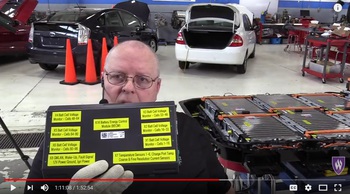ℬête Noire
Active Member
It sounds like unexpectedly reaching end-of-charge left in the battery. There is, in my understanding, a separate reserve kicks in beyond the zero charge remaining level. When you're drawing on that the vehicle switches into "limp" mode, heavily limited the amount of current you can draw and thus the maximum speed you can travel at.Well that sucks... hopefully just an outlier. I haven't heard of this being a widespread Bolt problem.
I wonder what the actual failure was? Doesn't sound like contactor issues, as it was "reduced power" for a bit, not sudden shutdown.
Whether this was an issue with how charge was being measured, thus it wasn't as full charge as the vehicle's sensors thought up until the point there just wasn't any left (so in effect it hadn't been properly fully charged), or there was a failure in some of the battery cells/banks that created a sudden loss in availability, or maybe again a sensor issue where there really was charge left but the computer considered it not there? *shrug*




